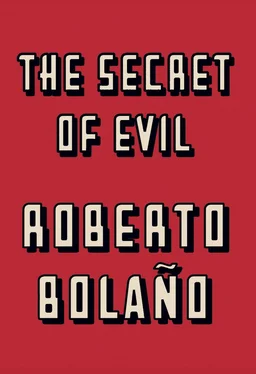Sometimes Belano examines the groove.
He leans forward, he bends over, his spinal column curves like the trunk of a tree in a storm and he examines the groove: a deep, clean trace, parting a strange kind of skin, the mere sight of which makes him feel nauseous. The years go by. And they rewind. In 1975 Belano and Lima are friends, and every day they walk, unknowingly, along the brink of the abyss. Until one day they leave Mexico. Lima sets off for France and Belano for Spain. From now on, their lives, which have been joined, will follow different paths. Lima travels through Europe and the Middle East. Belano travels through Europe and Africa. Both fall in love, both try in vain to find happiness or to get themselves killed. Eventually, years later, Belano settles down in a village by the Mediterranean. Lima returns to Mexico. He returns to Mexico City.
But things have happened in the meantime. In 1975, Mexico City is a radiant place. Belano and Lima publish their poems, usually together, in the same magazines, and participate in readings at the Casa del Lago. By 1976, both are known to, and above all feared by, a literary establishment that simply cannot stand them. Two wild, suicidal ants. Belano and Lima lead a group of adolescent poets who have no respect for anyone. Anyone at all. An unforgivable offence for the literary powers that be; Belano and Lima are blackballed. This is in 1976. At the end of the year, Lima, who is Mexican, leaves the country. Shortly afterward, in January 1977, Belano, who is Chilean, follows him.
That’s how it goes. 1975. 1976. Two young men sentenced to life. Europe. A new phase beginning and — as it begins — pulling them back from the brink of the abyss. And separation, because although it’s true that Belano and Lima meet in Paris and then in Barcelona and then in a railway station in Rousillon, their destinies eventually diverge and their bodies move apart, like two arrows suddenly, inevitably, veering off on separate trajectories.
So that’s how it goes. 1977. 1978. 1979. And then 1980, and the ’80s, a black decade for Latin America.
All the same, every now and then, Belano and Lima hear news of each other. Belano, especially, hears about Lima. One day, for instance, he hears that his old friend has been hit by a bus, and miraculously survived. The accident leaves Lima with a limp for the rest of his life. It also converts him into a legend. Or that’s what Belano thinks, anyway, far away from Mexico City. From time to time, a friend who lives in Barcelona has visitors from Mexico, who bring news of Lima, which the friend then passes on to Belano.
You’re not going to believe this, but last night, at about four a.m., I saw a movie on TV that could have been my biography or my autobiography or a summary of my days on this bitch of a planet. It scared me so fucking shitless I tell you I just about fell off my chair.
I was stunned. I could tell right away the film was bad, or the sort we call bad — poor fools that we are — because the actors aren’t much good and the director’s not much good and the cretinous special effects guys are pretty hopeless too. But really it was just a very low-budget film, pure B-grade schlock. What I mean, just to be perfectly clear, is a film that cost about four euros or five dollars. I don’t know who they conned to raise the money, but I can tell you that all the producer shelled out was a bit of small change, and they had to make do with that.
I can’t even remember the title, really I can’t, but I’ll go to my grave calling it The Colonel’s Son , and I swear it was the most democratic, the most revolutionary film I’d seen in ages, and I don’t say that because the film in itself revolutionized anything, not at all, it was pathetic really, full of clichés and tired devices, prejudice and stereotypes, and yet at the same time every frame was infused with and gave off a revolutionary atmosphere, or rather an atmosphere in which you could sense the revolution, not in its totality, but a fragment, a minuscule, microscopic fragment of the revolution, as if you were watching Jurassic Park , say, except the dinosaurs never showed, no, I mean as if it was Jurassic Park and no one ever even mentioned the fucking reptiles, but their presence was inescapable and unbearably oppressive.
Do you see what I getting at? I’ve never read any of Osvaldo Lamborghini’s Proletarian Chamber Theater , but I’m certain that Lamborghini, with his masochistic streak, would have been happy to watch The Colonel’s Son at three or four in the morning. What was it about? Well, don’t laugh, it was about zombies. No kidding, like George Romero’s movies, more or less; it had to be a kind of homage to Romero’s two great zombie flicks. But if the political background to Romero is Karl Marx, the political background to the movie last night was Arthur Rimbaud and Alfred Jarry. Pure French insanity.
Don’t laugh. Romero is straightforward and tragic: he talks about communities sinking into the mire and about survivors. He also has a sense of humor. You remember his second film, the one where the zombies wander around the mall because that’s the only place they can vaguely remember from their previous lives? Well, last night’s film was different. It didn’t have much of a sense of humor, although I laughed like a madman, and it wasn’t about a communal tragedy either. The protagonist was a boy who — I’m guessing, because I didn’t see the start — turns up one day with his girlfriend at the place where his father works. I didn’t see the start, like I said, so I can’t be sure. Maybe the boy goes to visit his father and that’s where he meets the girl. Her name is Julie and she’s pretty and young, and she wants to be — or seem to be — up to date, the way young people do. The boy is the son of Colonel Reynolds. The colonel is a widower and loves his son — that’s obvious right from the start — but he’s also a soldier, so the relationship that he has with his son is one in which there’s no place for displays of affection.
What is Julie doing at the base? We don’t know. Maybe she went to deliver some pizzas and got lost. Maybe she’s the sister of one of the guinea pigs that Colonel Reynolds is using, although that seems unlikely. Maybe she met the colonel’s son when she was hitching a ride out of the city. What we do know is that Julie is there and that at some point she gets lost in an underground labyrinth and innocently walks through a door that she never should have opened. On the other side is a zombie, and it starts chasing her. Julie flees, of course, but the zombie manages to corner her and scratch her; at one point he even bites her arm and her legs. The scene is suggestive of a rape. Then the colonel’s son, who’s been searching for her, appears, and between them they manage to overpower and kill the zombie, if such a thing is possible. Then they flee down increasingly narrow and tortuous underground passages, until they finally make their way out through the sewers to the surface. As they’re escaping, Julie begins to feel the first symptoms of the illness. She’s tired and hungry and begs the colonel’s son to leave her or forget her. His resolve, however, is unshakeable. He has fallen in love with Julie, or perhaps he was already in love (which suggests that he has known her for some time); in any case, armed with the generosity of the very young, he has no intention, come what may, of leaving her to face her fate alone.
When they reach the surface, Julie’s hunger is uncontrollable. The streets have a desolate look. The film was probably shot on the outskirts of some North American city: deserted neighborhoods, the sort of half-derelict buildings that directors who have no budget use for shooting after midnight. That’s where they end up, the colonel’s son and Julie, who’s hungry; she’s been complaining all the time they were running away. It hurts, I’m hungry: but the colonel’s son doesn’t seem to hear; all he cares about is saving her, getting away from the military base, and never seeing his father again.
Читать дальше












